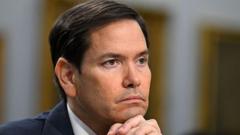The diminishing appeal of U.S. research labs could mark a pivotal shift in global scientific innovation, as visa restrictions and funding cuts discourage talented minds from coming to America.
Decline in U.S. Scientific Prestige as Global Talent Migrates Elsewhere

Decline in U.S. Scientific Prestige as Global Talent Migrates Elsewhere
Political turmoil and funding cuts threaten America's scientific leadership, driving international researchers to seek opportunities abroad.
In recent years, Bangalore, India, has emerged as a significant hub for developing scientific talent, with many Ph.D. graduates traditionally looking to further their careers in the United States. However, shifts in the political climate and strict immigration policies have led to a stark decline in interest among these graduates.
Dr. Raj Ladher, a professor at the National Center for Biological Sciences, shared that out of approximately 30 recent graduates, only one secured a job in the U.S. This alarming statistic reflects a broader trend; many are turning their attention to research opportunities in countries such as Austria, Japan, and Australia.
The Trump administration's significant budget cuts to scientific research and tough actions on visa provisions have left American scientists concerned. David W. Hogg, a physics and data science professor at New York University, voiced a critical warning that ongoing policies could destroy American science. The inability to collaborate with non-U.S. scientists poses a serious threat to various fields of research.
As the global landscape for scientific research evolves, the U.S. could risk losing its longstanding status as a leader in scientific innovation, with an increasing number of talented researchers opting for opportunities abroad rather than navigating the challenges at home.
Dr. Raj Ladher, a professor at the National Center for Biological Sciences, shared that out of approximately 30 recent graduates, only one secured a job in the U.S. This alarming statistic reflects a broader trend; many are turning their attention to research opportunities in countries such as Austria, Japan, and Australia.
The Trump administration's significant budget cuts to scientific research and tough actions on visa provisions have left American scientists concerned. David W. Hogg, a physics and data science professor at New York University, voiced a critical warning that ongoing policies could destroy American science. The inability to collaborate with non-U.S. scientists poses a serious threat to various fields of research.
As the global landscape for scientific research evolves, the U.S. could risk losing its longstanding status as a leader in scientific innovation, with an increasing number of talented researchers opting for opportunities abroad rather than navigating the challenges at home.






















